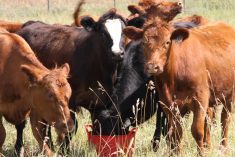Canada is shooting itself in the foot by defending supply management while also claiming to advocate free trade, says a prominent livestock industry analyst.
Charlie Gracey described the current trade stance as indefensible and suggested it comes at the expense of the beef cattle industry, which is heavily dependent on an ability to export.
“Canadian political leadership essentially sidelined themselves. Hell, they shot themselves in the foot by insisting on a so-called balanced position,” said Gracey, during the Manitoba Cattle Producers Association annual meeting in Brandon last week.
Read Also

The Organization for Economic Co-operation and Development lauds Canada’s low farm subsidies, criticizes supply management
The Organization for Economic Co-operation and Development lauded Canada’s low farm subsidies, criticized supply management in its global survey of farm support programs.
He was referring to the latest round of world trade negotiations, held last month in Hong Kong. He said Canada’s political leadership gives the appearance of pressing for more open trade but remains determined to protect supply management for dairy and poultry industries.
“There has to be a more candid debate about this untenable position,” he said, arguing that the interests of the beef cattle industry should be given more weight, considering what the industry contributes to the Canadian economy.
According to the information circulated at the Manitoba Cattle Producers meeting, the beef cattle industry remains the largest single source of farm cash receipts in Canada. Beef production contributed $20 billion to the Canadian economy in 2004.
Arno Doerksen, chair of the Canada Beef Export Federation, was also critical of the dual message Canada sends during international trade negotiations for agriculture.
“The world is changing,” said Doerksen. “It’s important that we as an agriculture industry get ready for that.
“Eighty percent of Canadian agriculture is extremely dependent on trade. We need to take that seriously and act like traders, talk like traders and deliver on that basis.”
Doerksen and Gracey were among the panelists invited to speak at the cattle producers meeting about how trade disruptions could be avoided in the future.
Doerksen said the partnership between industry and government needs to be strengthened when it comes to advocating for trade.
Gracey cited the need for improvements to trade agreements, drawing particular attention to the ease with which anti-dumping challenges can be brought against Canadian experts.
Canada’s leaders must also “fight for and uphold the rules in trade agreements that presently exist,” Gracey said.














